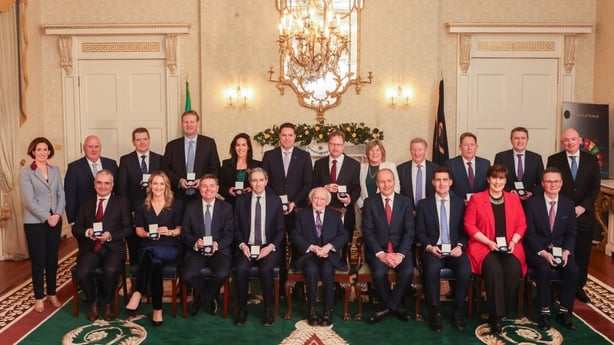The first woman to be elected Ceann Comhairle of the Dáil, Verona Murphy, will host a celebration at Leinster House today to mark the approaching St Brigid's bank holiday weekend - named after Ireland's first female patron saint.
Among those participating is Ireland's Women's Parliamentary Caucus: a cross-party forum for female TDs and Senators which often discusses gender equality.
Yesterday's appointments by Taoiseach Micheál Martin and Tánaiste Simon Harris of their minister of state line-up will give scope for plenty of debate.
The Sinn Féin leader Mary Lou McDonald has accused the Government of blatant sexism. The fact that only six were selected from 23 available positions, she said, proved the process was just "jobs for the boys".
She made the comment while reposting a message from her party colleague, Louise O'Reilly, with the hashtag: #everydaysexism.
18 jobs announced today but only 3 women 🙄
— Louise O'Reilly TD for Dublin Fingal West (@loreillysf) January 29, 2025
What the hell are this government at??#EverydaySexism https://t.co/SKWAuaI18h
The Coalition leaders are in a tight spot.
Of 15 senior ministries in the 34th Dáil, only three women have been appointed to Cabinet - that's one down on the previous administration.
Of 23 junior ministries, only six women were given jobs - that's the same number as in the previous Coalition but it had three fewer slots.
The man sent out to defend the Coalition on its approach to gender equality on the RTÉ Six One News was Niall Collins, who retained his minister of state status in the shake-up.
Echoing an earlier briefing to political journalists, the Limerick County deputy pointed out that of the seven Fianna Fáil TDs who are women, the Taoiseach Micheál Martin has appointed four to ministerial ranks.
He added that in the recent General Election, of the 82 candidates selected by his party across all of the constituencies, a record 34 of them were women.
But he concluded: "At the end of the day, the people of Ireland decide who their individual TDs and public representatives are going to be."
That's a fact but it's also a problem.
It's a problem because it appears to absolve political parties from the primary responsibility of identifying women candidates; training them; selecting them for winnable seats rather than as sweepers for incumbents; and finally, backing them in their election campaigns.
And it also ignores the reality of how Ireland compares with its European neighbours.
In Finland, Belgium and France at least half of their Cabinet Ministers are women.
The EU average is 33%. In Ireland it's a paltry 20%.

In briefings last night, political journalists were told that Taoiseach Micheál Martin and Tánaiste Simon Harris are ambitious to increase the number of women in Irish politics, and are committed to doing everything they can to deliver on this.
Although gender quotas have helped, ensuring that parties run a minimum of 40% men and 40% women candidates in a General Election, it will take time for women candidates to replace male incumbents as they have a significant electoral advantage.
This is just one of the systemic barriers faced by women in accessing political power.
The chair of the Women for Election group, Aldagh McDonogh, wrote last week: "We cannot allow outdated structures and attitudes to perpetuate a system where half the population is sidelined in political decision-making."
Following yesterday's announcement, Ms McDonogh added: "There are serious questions to ask of this new Government about the rationale of continuing to exclude women's voices, expertise and lived experience from Government decision-making levels".
One of the women who did win yesterday was Fianna Fáil's Niamh Smyth from the Cavan-Monaghan constituency.
The freshly minted minister of state told my colleague Mary Regan: "Unfortunately, we have to get more women elected. And that is the bottom line."
There was some dissent within the Fianna Fáil ranks: Cllr Racheal Batten, from Dublin's Artane/Whitehall ward, posted on social media "Great gender balance" underneath a picture of the new ministers of state posing on the steps of Government Buildings.
Great gender balane🙄
— Cllr Racheal Batten (@BattenFf) January 29, 2025
The Taoiseach and Tánaiste say their commitment to women playing an increasingly significant role in Irish politics will be further reflected in appointees to the Seanad and the selection of Oireachtas Committee chairs.
Yet according to the Opposition, this past week has been a huge missed opportunity when it comes to promoting women in politics.
Jen Cummins of the Social Democrats put it this way: "Instead of making progress on increased gender balance, the government is again going backwards.
"Ireland has the worst gender balance of parliaments in western Europe, with women making up only 25% of TDs," she added.
No doubt the question will be asked at today's St Brigid Day celebrations in Leinster House, how many more election cycles will it take before Ireland can finally boast a truly representative democracy.







